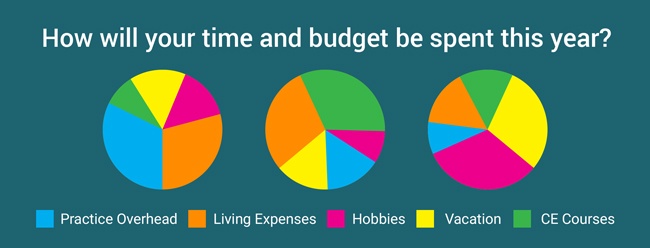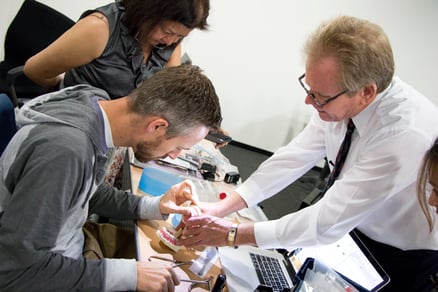It’s the start of a new year which means it’s time to plan your dental CE courses for the year. Undoubtedly, you can only dedicate so much time to continuing education between your patient schedule and personal life. So it’s important to make the most of the time you can commit to education.

To ensure you maximize your CE calendar this year, be sure to ask these important questions before booking your courses.
1. Will the time spent away from my practice and family be justified?
When considering any CE course, assess if the knowledge and skills you’ll take home will justify the time spent away from your office and family. Think about how much it costs you to be out of the office compared to how much earning potential you’ll gain with your new knowledge. It’s also important to consider non-financial opportunity costs, such as time spent away from family. In some cases, sacrificing a family weekend will be unavoidable, but if the knowledge you gain from a course is valuable enough, your sacrifices will pay off in the long run.
2. Does this course fit my budget & schedule?
Understand the time commitment and tuition costs before booking any course. Be honest about your constraints so you don't set yourself up to miss your goals. If you know that you can only attend 2 days of a 4-day course, consider choosing another program, or wait to enroll for a better time.
Take courses that you can afford, especially those that will get you a quick return on your investment. Not sure if you can afford the course you want? Always ask if you are eligible for any discounts. Many CE providers offer early registration discounts and savings for recent dental school graduates.

3. Does this course fit my learning style?
If you are a visual learner, you might prefer in-person courses with live demonstrations. If you’re an auditory learner, you might prefer an online video course that you can start and pause at your own pace. If you’re a kinesthetic learner, you’ll prefer courses with lots of hands-on opportunities. No matter what type of learner you are, it’s likely that there is a course out there that will fit your needs for whatever topic you are interested in. Be sure to research the options for each course, and find out if there any additional supplemental materials included.
4. Is this course sponsored by a manufacturer?
In the dental field, it’s all too common for CE classes to be sponsored by a product manufacturer. These courses are not necessarily bad, as long as you are aware of the company’s intention to sell you a product and what that means for your education. Manufacturers may limit the practical knowledge of dealing with complications if they want to paint a rosy picture so that you'd buy their product.
If a course you want to attend is a sponsored one, ask whether the education is based on research done by the manufacturer or an independent organization. Rule of thumb: avoid potential bias by attending non-sponsored CE whenever possible.
5. Does the organization have a good reputation?
There are many ways to determine whether your CE provider has a strong reputation. First and foremost, if you are a dentist in the U.S., ensure that the organization is AGD and ADA accredited. AGD and ADA do thorough background checks so that you know that you'll learn from a company that is fair, honest, and truly educational.
Next, research the organization’s background. How long have they been in business? How many students have gone through this program? What is their core philosophy? Web presence can also tell you a lot about an organization. How many engaged followers do they have across social media platforms such as Facebook, Twitter, and LinkedIn? A quick, 15-minute Google search should yield most of the information you need.
6. What do my friends and colleagues think of the course?
Find out if your friends and colleagues have taken the course, or ask around at other CE programs. You'll be surprised that some doctors take hundreds of hours of CE and can provide useful comparisons on which courses are excellent and which will waste your time. You can also check dental message boards like Dentaltown.com or look at reviews on Facebook. Oftentimes first-hand accounts from someone you trust will be the most valuable information source about CE programs.
7. Is there a free trial?
Many programs offer some type of free trial, whether it’s a free day of education or a free streaming video online. Before you invest your time and money, sample the program. Check the organization’s website and social media accounts for special offers. They may offer different trials on different networks, so be sure to check them all or call and ask what’s available.
8. Will this course strengthen my current knowledge, or expand it with something new?
Determine your goal for attending the course. Are you looking to learn an entirely new skill, or do you want to expand upon your current knowledge? Can this course help you reach that goal? It may be best to speak with a course advisor or instructor who can give you personalized, detailed information.
9. How will this knowledge benefit my patients?
Arguably the most important question of all. As a general dentist, you should always strive to expand your knowledge for the sake of improving your patient care. Patients can benefit when you add more treatment options to your practice and when your care is more efficient. To determine if a course will help your patients, first look at how the course has helped others, and then determine if it makes sense for you and your community.

Keep these questions in mind when you book your next dental CE course. With an efficient course schedule, you, your patients, and even your family will benefit!
At Progressive Orthodontic Seminars, we offer many CE opportunities all year long. Sign up for a free introductory seminar this spring and earn up to 8 CE!

